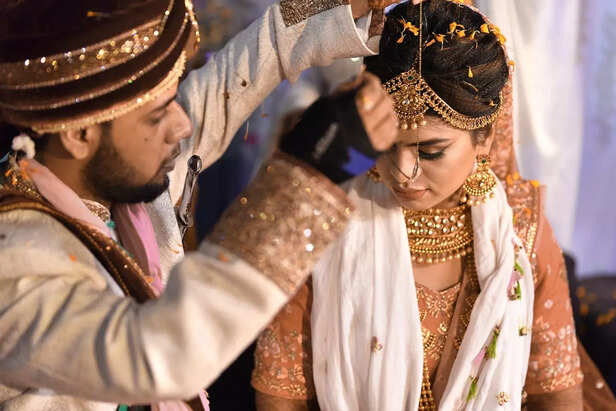Did Indian Parents Ruin Love? The Truth About Generational Trauma in Relationships
Nikita Kanyal | Feb 28, 2025, 23:08 IST
( Image credit : Timeslife )
Did Indian parents unknowingly ruin love for an entire generation? From guilt-tripping us about relationships to making love feel like a rebellion, their deep-rooted fears and societal expectations have created a cycle of generational trauma. Why do so many Indian kids struggle with love, commitment, and emotional security? Is the obsession with arranged marriages killing real relationships? This brutally honest article uncovers the truth about Indian parenting, love, and toxic generational patterns and how we can break free! If you've ever felt guilty for choosing love over tradition, this one’s for you.
Love. It’s supposed to be the most beautiful, liberating experience. But for many Indians, love is often entangled with guilt, parental approval, and the crushing weight of generational expectations. Have our parents bwithout even realizing it ruined our ability to love freely?
The Generational Trauma No One Talks About

Indian parents have endured struggles we’ll never fully comprehend. Many of them sacrificed dreams, settled in arranged marriages, and prioritized survival over self-expression. While their resilience is commendable, their approach to love has left deep scars on their children.
The trauma they carry manifests in their parenting strict rules, emotional manipulation, and an obsession with ‘log kya kahenge’ (what will people say?). Love, in their world, is not about personal happiness; it’s about societal validation.
Love Taught Through Fear, Not Freedom

From a young age, Indian kids are conditioned to believe that love is secondary to family honor. Expressions of affection are rare. Hugs? Uncommon. "I love you"? Almost unheard of. Instead, we hear things like:
Even when we grow up and fall in love, our parents’ voices haunt us. Many of us struggle with:
The ‘Marriage Pressure’ That Kills Love

For Indian parents, love isn’t love until it ends in marriage. And once marriage enters the conversation, love gets burdened with caste, community, finances, horoscope matches, and parental approval. This pressure destroys relationships before they even begin. How many love stories have been crushed because parents refused to approve? How many couples have eloped just to escape controlling families? How many people have married someone ‘acceptable’ only to live with regret?
Breaking the Cycle: Can We Love Differently?

Generational trauma doesn’t have to define us. We can unlearn these patterns and choose love without fear. Here’s how:
Acknowledge the Trauma – Recognize how parental conditioning has shaped your views on love. Understanding this is the first step to healing.
Set Boundaries – Love shouldn’t come at the cost of personal freedom. It’s okay to say no to emotional manipulation.
Reparent Yourself – Give yourself the love and validation you never received. Learn to express affection without fear.
Choose Love Over Fear – Don’t let outdated beliefs stop you from embracing a fulfilling relationship.
Communicate with Parents – Not all parents will understand, but having honest conversations about their fears vs. your desires can create change.
Can We Fix This?
Our parents weren’t trying to ruin love; they were trying to protect us the only way they knew how. But their fears don’t have to be our reality. Love is meant to be freeing, joyful, and authentic not a burden of expectations. It’s time we redefine love, not as something that needs approval, but as something that needs to be felt. Can we be the generation that finally breaks the cycle? Can we love without guilt, fear, and the shadows of the past?
The Generational Trauma No One Talks About

Generational Trauma
( Image credit : Pexels )
Indian parents have endured struggles we’ll never fully comprehend. Many of them sacrificed dreams, settled in arranged marriages, and prioritized survival over self-expression. While their resilience is commendable, their approach to love has left deep scars on their children.
The trauma they carry manifests in their parenting strict rules, emotional manipulation, and an obsession with ‘log kya kahenge’ (what will people say?). Love, in their world, is not about personal happiness; it’s about societal validation.
Love Taught Through Fear, Not Freedom

No Freedom
( Image credit : Pexels )
From a young age, Indian kids are conditioned to believe that love is secondary to family honor. Expressions of affection are rare. Hugs? Uncommon. "I love you"? Almost unheard of. Instead, we hear things like:
- "Focus on your studies first. Love can wait."
- "You’re too young to know what love is."
- "What will people say if they find out?"
- "Marriage isn’t about love. It’s about stability."
Why We Struggle to Love Freely
- Guilt: Loving someone they don’t approve of feels like a betrayal.
- Fear of Judgment: Choosing love over arranged expectations is seen as selfish.
- Self-Sabotage: Many Indians push away relationships due to ingrained fears of disapproval.
- Attachment Issues: Growing up in emotionally distant homes creates insecure attachment patterns.
The ‘Marriage Pressure’ That Kills Love

Marriage Pressure
( Image credit : Pexels )
For Indian parents, love isn’t love until it ends in marriage. And once marriage enters the conversation, love gets burdened with caste, community, finances, horoscope matches, and parental approval. This pressure destroys relationships before they even begin. How many love stories have been crushed because parents refused to approve? How many couples have eloped just to escape controlling families? How many people have married someone ‘acceptable’ only to live with regret?
Breaking the Cycle: Can We Love Differently?

Loving Differently
( Image credit : Pexels )
Generational trauma doesn’t have to define us. We can unlearn these patterns and choose love without fear. Here’s how:
Acknowledge the Trauma – Recognize how parental conditioning has shaped your views on love. Understanding this is the first step to healing.
Set Boundaries – Love shouldn’t come at the cost of personal freedom. It’s okay to say no to emotional manipulation.
Reparent Yourself – Give yourself the love and validation you never received. Learn to express affection without fear.
Choose Love Over Fear – Don’t let outdated beliefs stop you from embracing a fulfilling relationship.
Communicate with Parents – Not all parents will understand, but having honest conversations about their fears vs. your desires can create change.
Can We Fix This?
Our parents weren’t trying to ruin love; they were trying to protect us the only way they knew how. But their fears don’t have to be our reality. Love is meant to be freeing, joyful, and authentic not a burden of expectations. It’s time we redefine love, not as something that needs approval, but as something that needs to be felt. Can we be the generation that finally breaks the cycle? Can we love without guilt, fear, and the shadows of the past?
